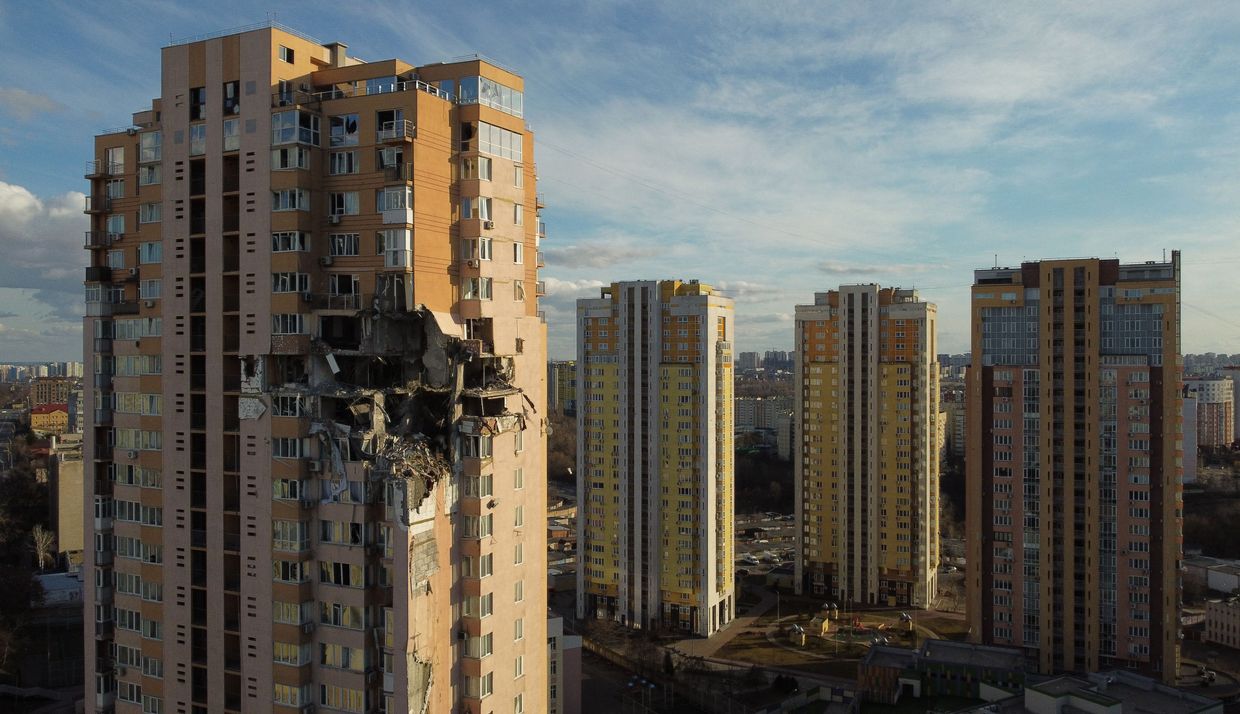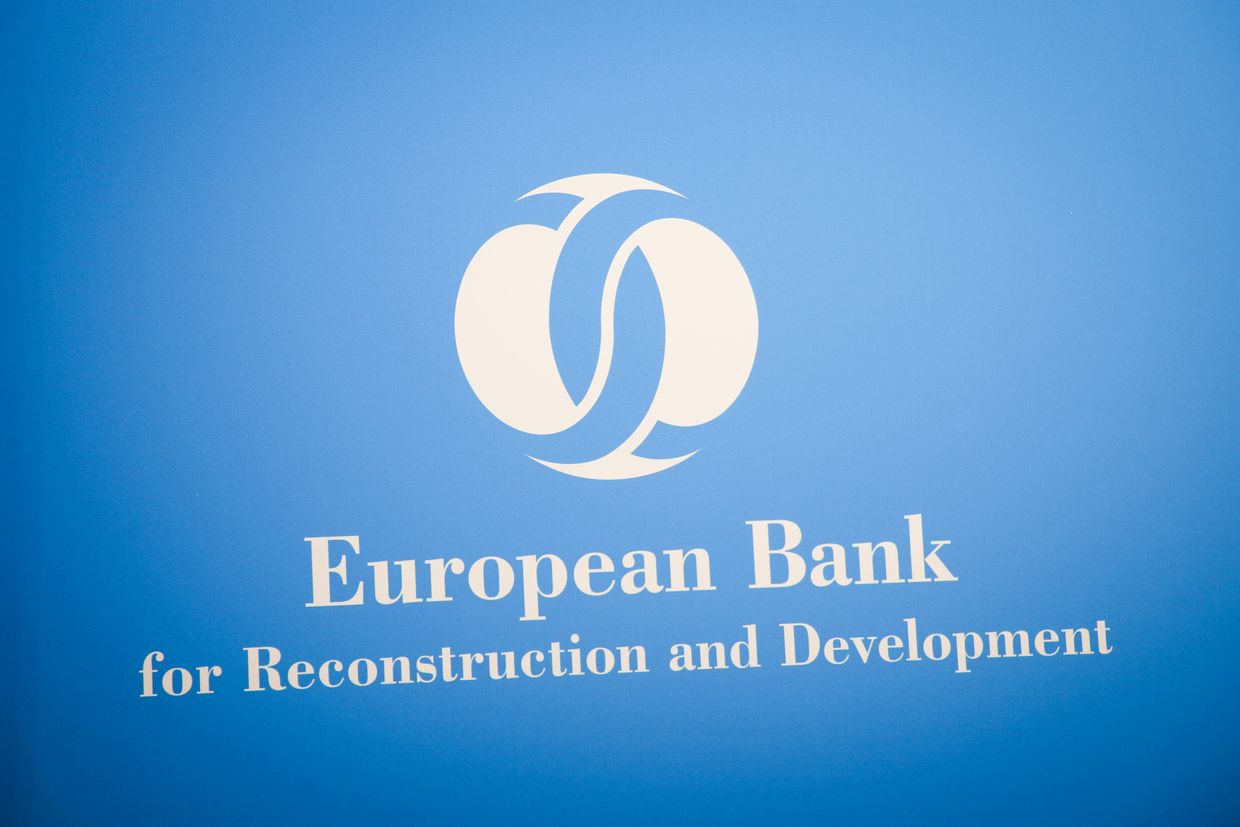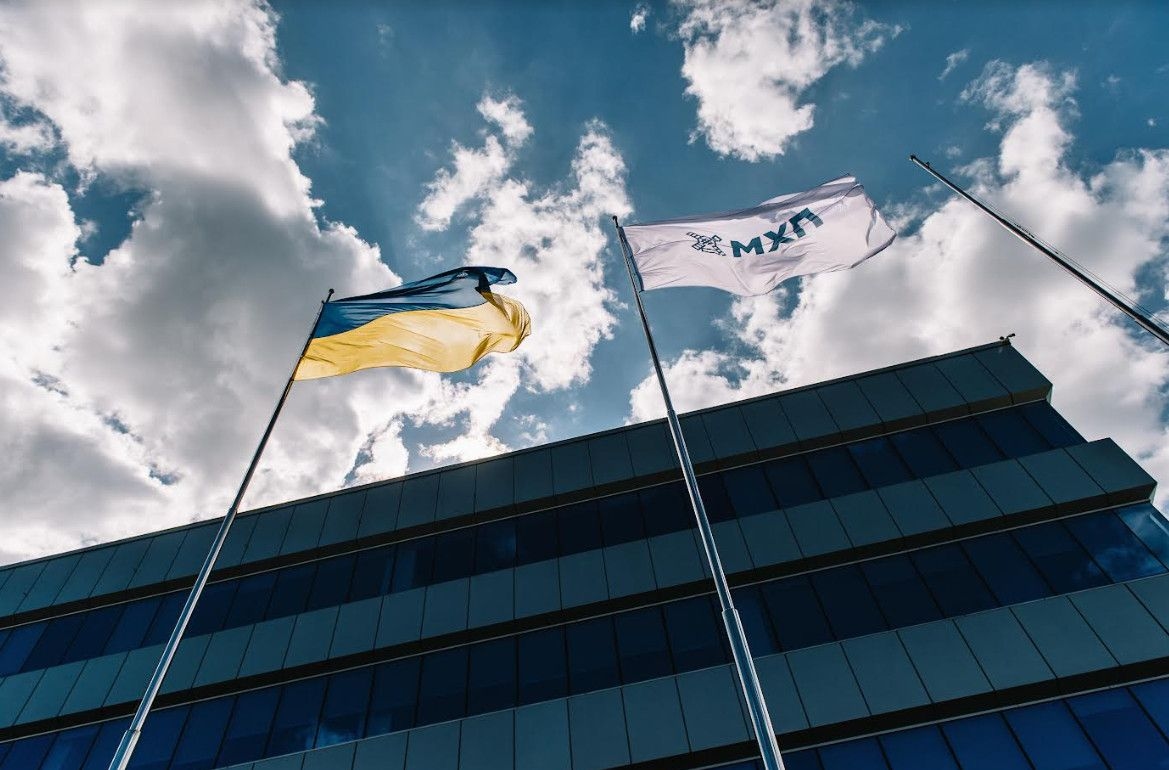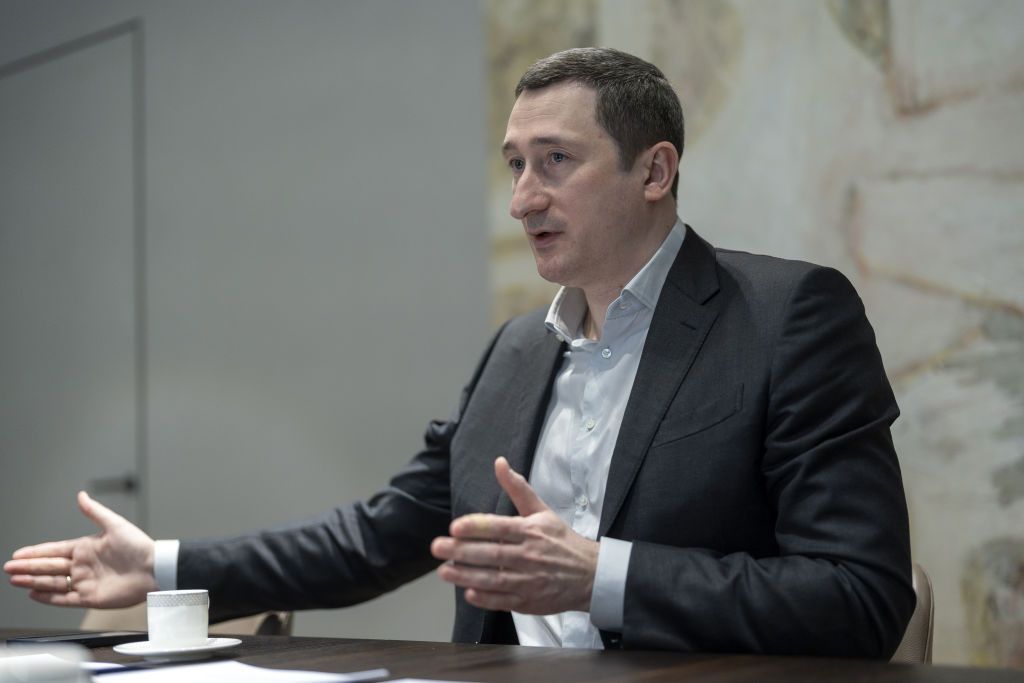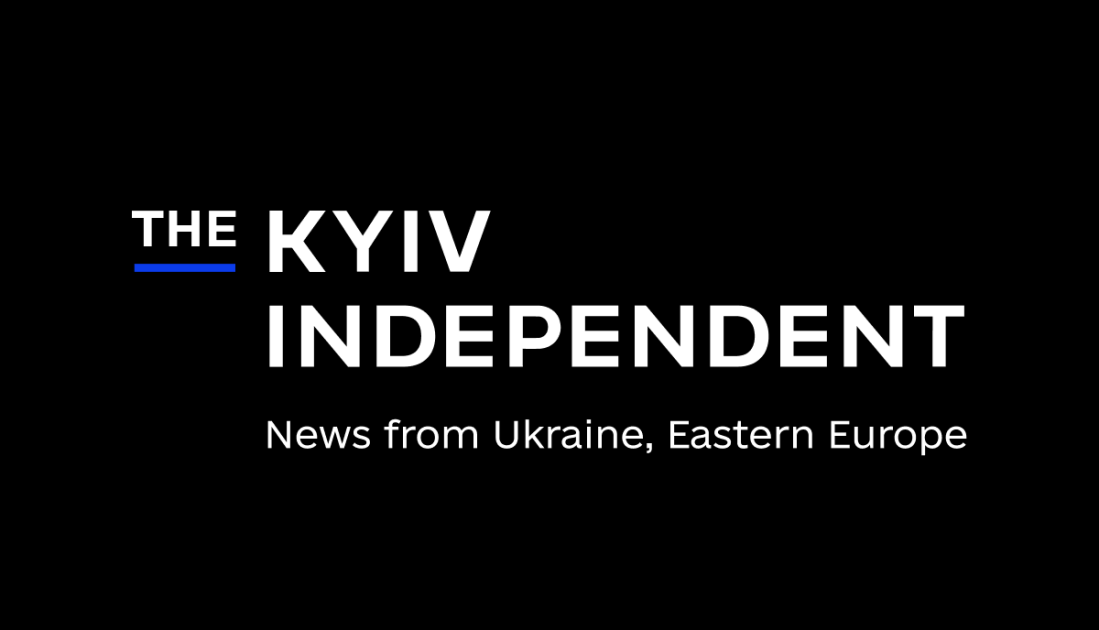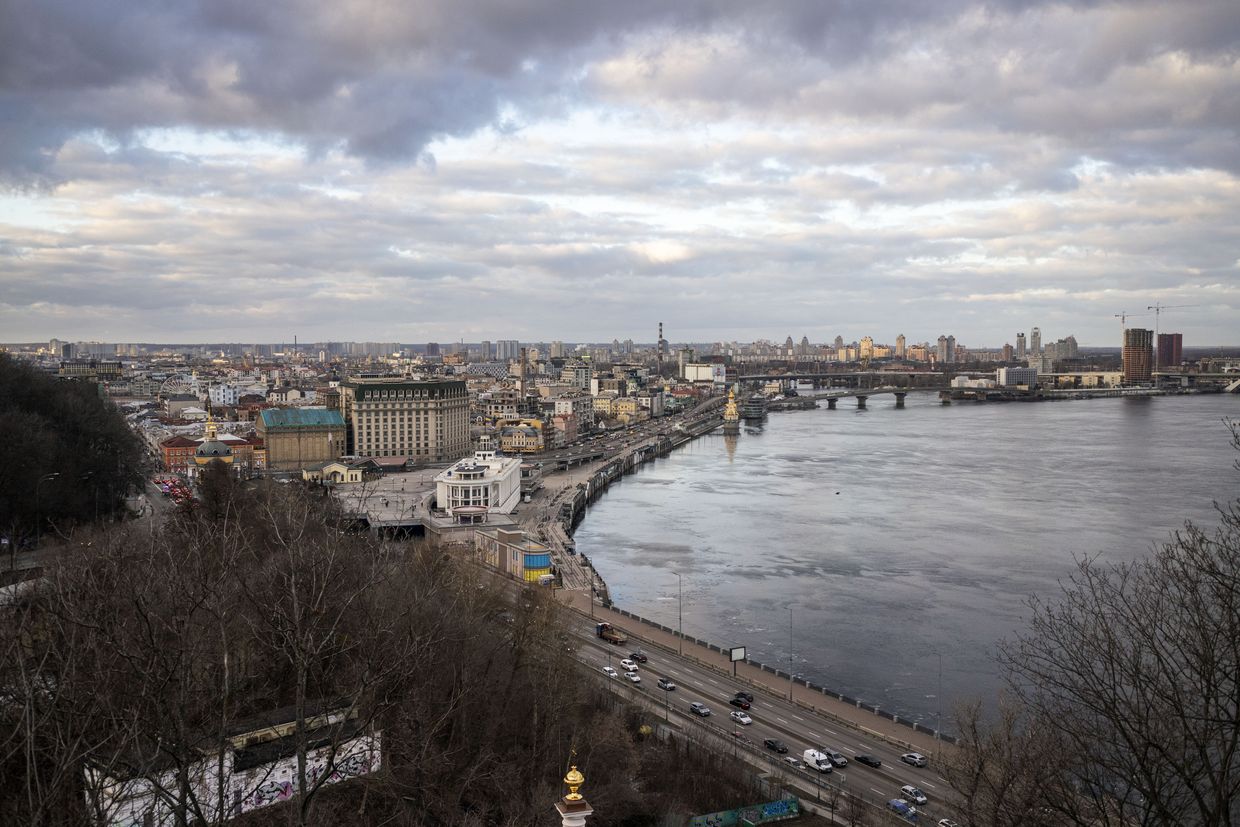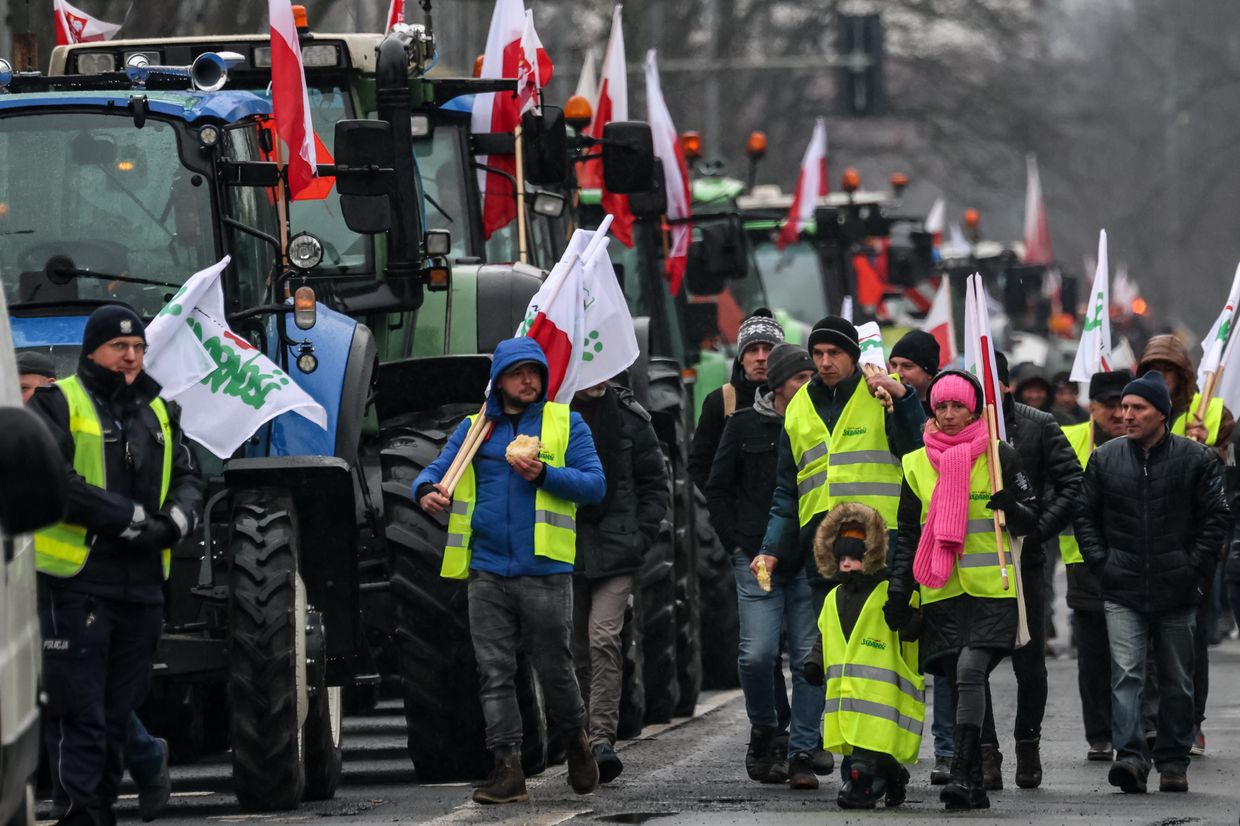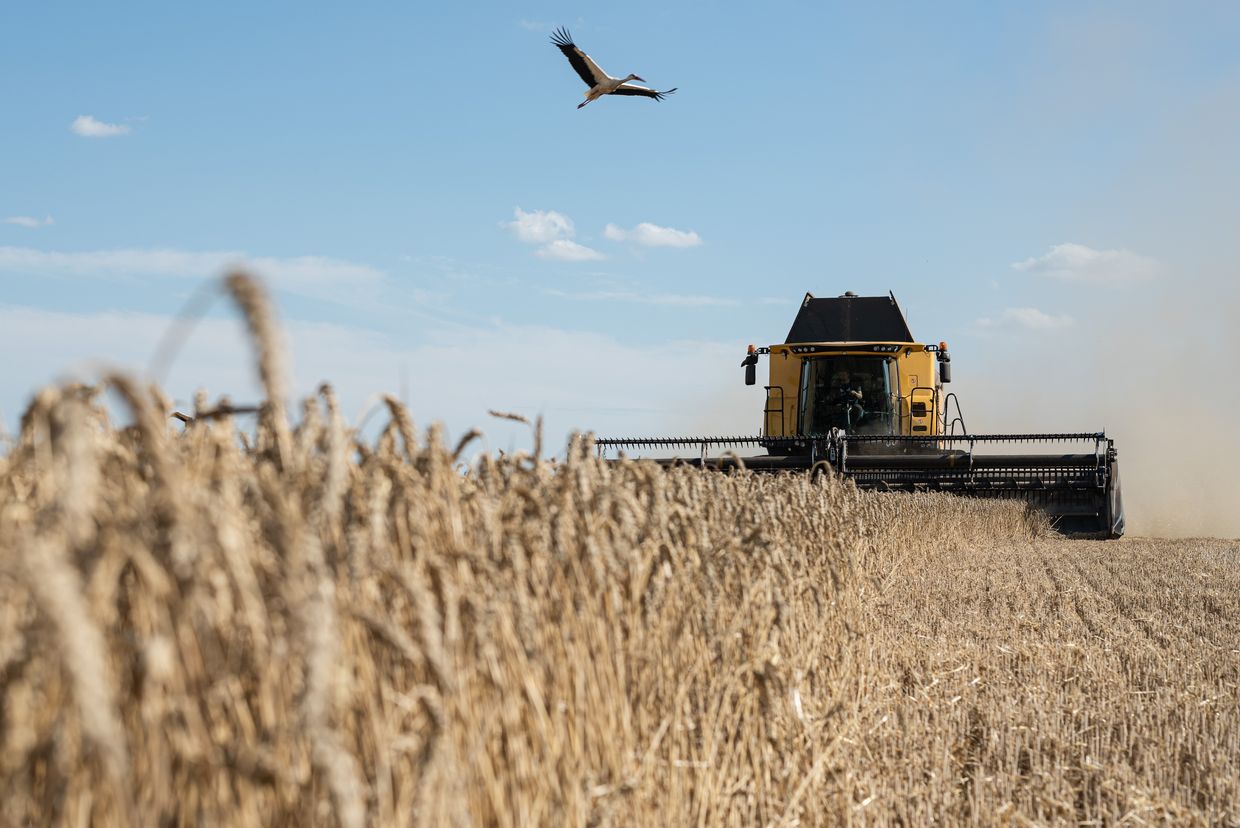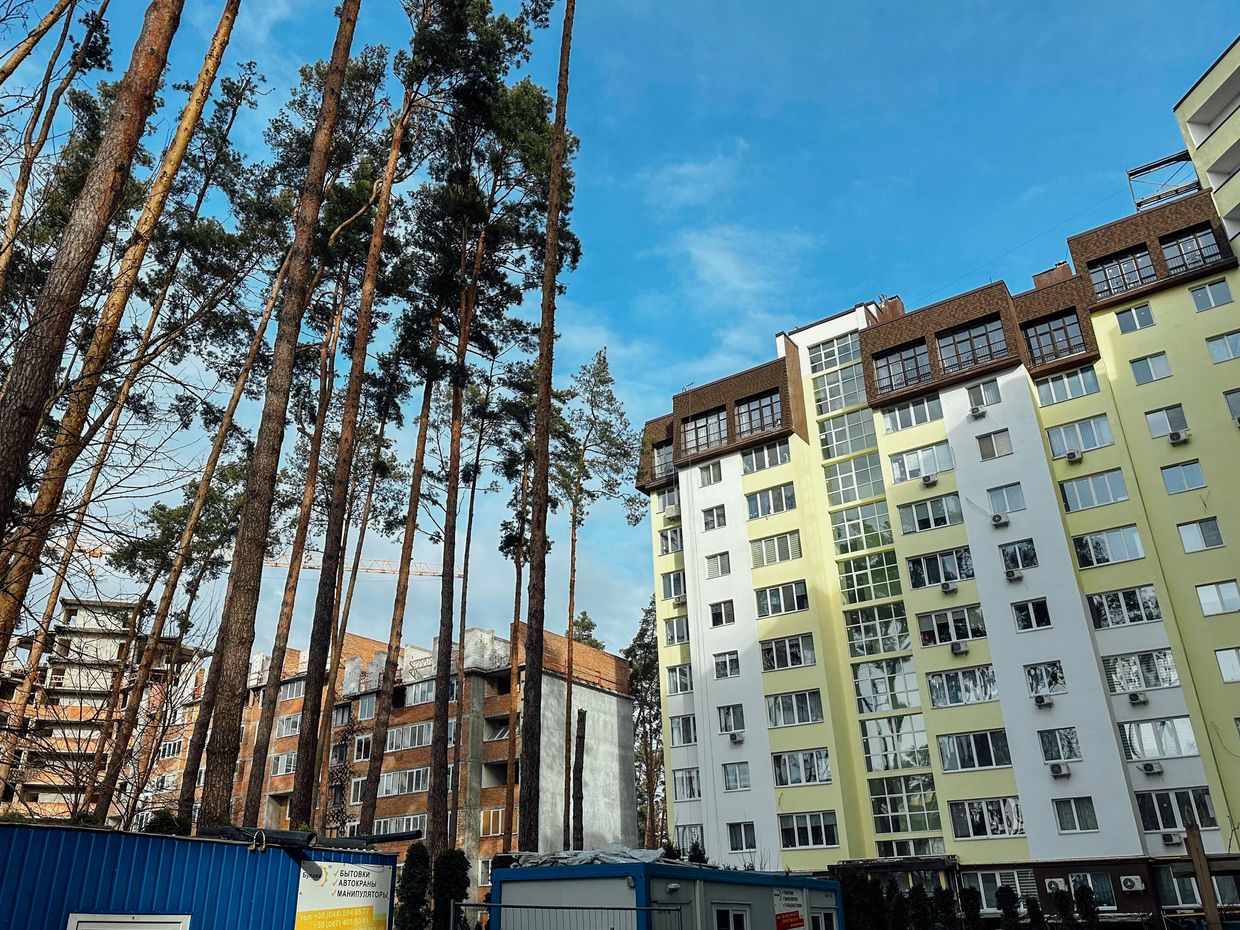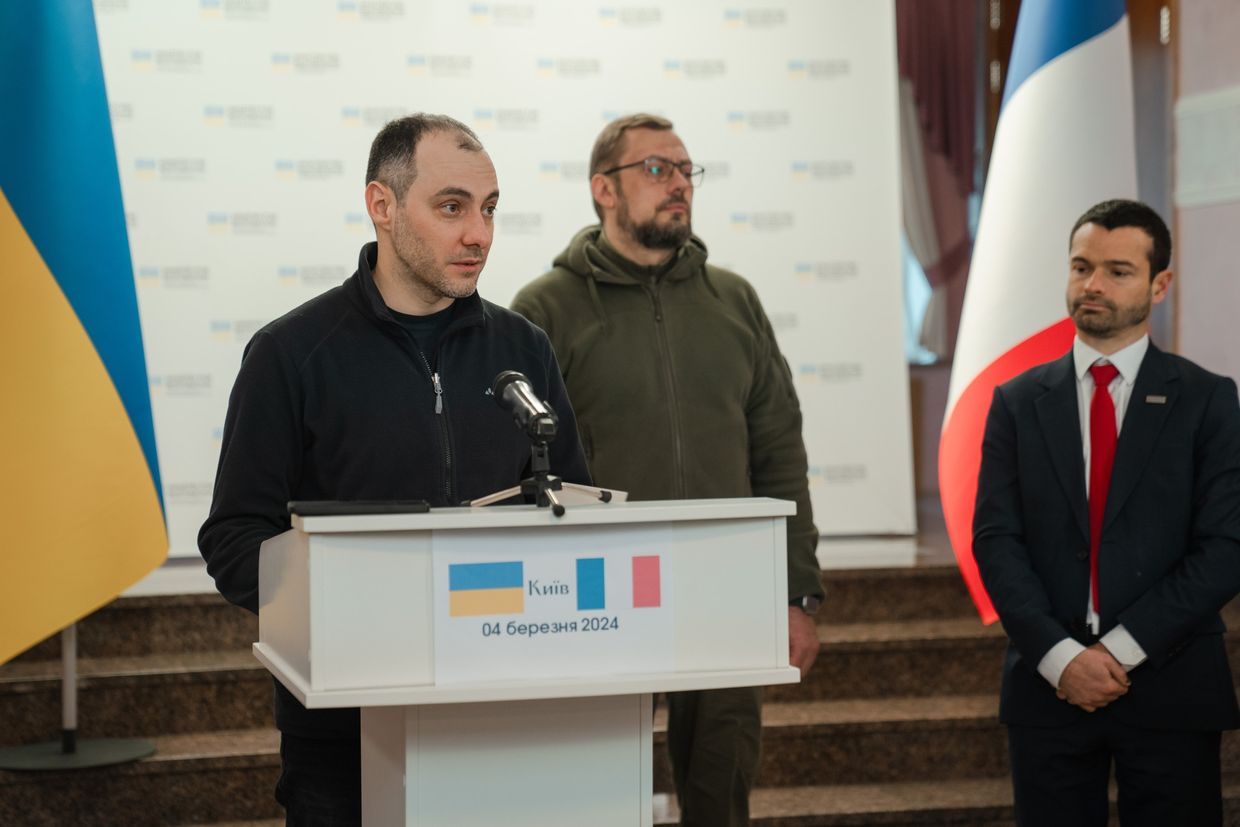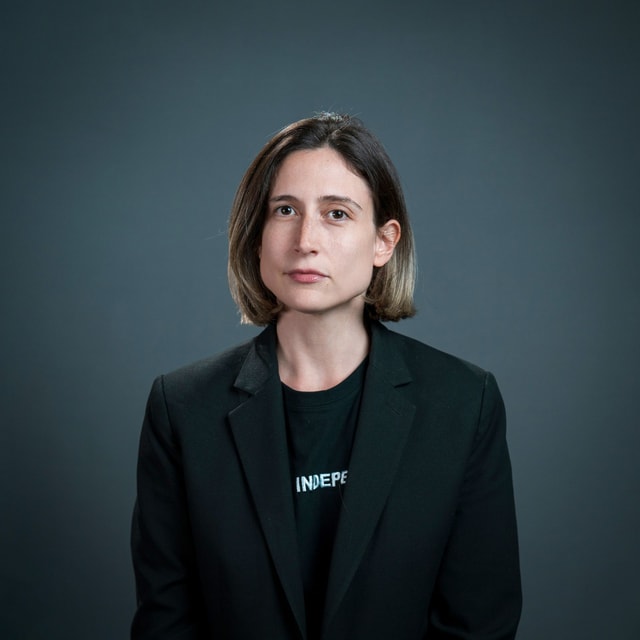EBRD president: ‘We decided to continue investing in Ukraine as early as February 2022’

Odile Renaud-Basso, president of the European Bank for Reconstruction and Development, following a Bloomberg Television interview in London, U.K., on March 10, 2022. (Hollie Adams/Bloomberg via Getty Images)
The start of Russia’s full-scale invasion of Ukraine was an unlikely place for investment. Russian attacks all over the country were destroying critical infrastructure, factories, and homes. The economy took a major hit, with GDP falling 29% that year.
The European Bank for Reconstruction and Development, which has been actively investing in Ukraine since the collapse of the Soviet Union and one of the few multilateral development banks still operating in the country despite the war, felt it couldn’t sit this one out.
“Very early on in February 2022, we decided to continue investing in Ukraine and take the risk on our balance sheet. It's very unusual for a bank to intervene in a war and conflict situation, but we felt it was part of our responsibility,” EBRD President Odile Renaud-Basso told the Kyiv Independent in a recent interview.
Following the start of the full-scale invasion, the bank invested 3.8 billion euros in 2022-2023. By February 2024, that number had reached 4 billion euros.
In 2023, 1 billion euros of investment went to Ukraine’s private sector, making up 90 percent of projects. Around 400 million euros went to trade finance, with the other 600 million euros funneled to Ukrainian financial institutions, in large part to support small and medium-sized businesses.
The bank’s board also approved a 4-billion-euro capital increase in December 2023 for only the third time in EBRD history to bring its capital base to 34 billion euros in order to sustain support for Ukraine long-term. The increase was crucial to ensure continued support for Ukraine, especially as critical funding for Kyiv remains tied up in the U.S. Congress.
The Kyiv Independent spoke to the bank’s president Renaud-Basso to discuss how the EBRD is supporting Ukraine while the country is at war, the challenges that remain to push through more reforms in the public sector, as well as the farmer protests in Europe in which Ukraine’s largest poultry producer, MHP — a major receiver of EBRD financing — has recently become embroiled.
The Kyiv Independent: Ukraine is obviously in a rough period right now with further funding tied up in the U.S. and a difficult situation on the battlefield. How does the EBRD assess what’s happening in the U.S. Congress and what are its contingency plans to make sure the bank can continue to support Ukraine regardless of what happens in the U.S.?
Odile Renaud-Basso: This support is really important because the U.S. has been instrumental in military support for Ukraine and we are at a time where speed is of the essence. I hope this support can be unlocked quickly. That being said, our support for Ukraine is not directly dependent on the package.
One caveat, of course, is the fact that we were able to provide so much financing because there was demand, Ukraine’s economy was in a relatively good position, and there was a rebound in 2023 that was conducive to private-sector investment.
What we’re able to do is very much related to the dynamics of the economy per se so if there’s no support and the economy collapses, the dynamics and investment opportunities will be different.

The Kyiv Independent: Considering the U.S. is the largest shareholder of the EBRD, is there a concern that what’s happening in Congress will have an effect on future support for Ukraine?
Odile Renaud-Basso: The U.S. supported the capital increase strongly. Once (a capital increase) is agreed upon, if a shareholder doesn’t subscribe, their weight in the shareholding of the EBRD is automatically diminished. It’s important that the U.S. is active and has an interest in supporting Ukraine, which is why I’m confident they will subscribe. But of course, I’m not in control of the process.
The capital increase as an instrument also has huge leverage compared with budget support. If (a shareholder) puts $1 in the bank, it can potentially unlock $4-6 in investment in Ukraine. This leverage gives you more impact on the ground.
The Kyiv Independent: There has only been a capital increase in the EBRD twice before in the bank’s existence. What was the driving force behind going for a capital increase this time to support Ukraine?
Odile Renaud-Basso: For our shareholders and us as a bank, Ukraine is a very important country historically and politically. We were created to deal with the transformation of post-Soviet economies.
Very early on in the winter of February 2022, we decided to continue investing in Ukraine and to take the risk on our balance sheet. It's very unusual for a bank to intervene in a war and conflict situation, but we felt it was part of our responsibility.
We (first) asked for 50% coverage in the form of grants and funded guarantees from our shareholders to mitigate the risk. We had $1.6 billion of donor support in different forms, but we realized that (this type of coverage) was quite costly and complex for our donors and that a capital increase would be a much more efficient way to give us the capacity to invest in Ukraine without these guarantees.
The decision (for a capital increase) was made relatively quickly and there was a lot of momentum behind it because there was the feeling it would give us the visibility to support Ukraine in a war situation and for reconstruction.
We’ve assessed different scenarios — from quick reconstruction to the one we’re in now where the war is going on longer than expected — and having the necessary capital to be able to deal with these various scenarios was a factor in the shareholders’ decision to go with the capital increase.
The Kyiv Independent: What are the challenges for an institution like the EBRD to allocate financing to a country that’s actively at war?
Odile Renaud-Basso: This is the first time that we are in a full-scale war situation, although we continued to intervene in Ukraine post-2014. It took a few months (after the start of the full-scale invasion) for us to define what our risk appetite was.
The fact that the (Ukrainian) government was still functional, able to make decisions, and to act as an interlocutor to define projects was not a given at the beginning of the war and nobody knew how things would develop.
With the war and all its challenges and all the country’s efforts put toward that, I thought it would be very hard to have structural reforms in parallel, to continue to pass laws in the Verkhovna Rada (Ukraine’s parliament), to apply for EU candidacy, and to make changes in governance, but this is what (the Ukrainian government) has been able to do.
The Kyiv Independent: I know that the EBRD has some expectations of structural reforms and corporate governance reforms particularly in the public sector. What have been some of the successes, especially in the public sector that the bank witnessed, and what are some of the biggest challenges in Ukraine to pushing through more reforms?
Odile Renaud-Basso: One big success was the International Monetary Fund’s (IMF) program. I think the IMF is very impressed with the country’s capacity to keep the budget under control, keep inflation down, and with the macroeconomic stabilization in the country.
We also feel very positively about the state-owned enterprise (SOE) reform that just passed in the parliament. I met with Deputy Prime Minister (and Economy Minister) Yuliia Svyrydenko who mentioned that (the SOE reform) is the outcome of eight years of work. The fact that in this difficult situation, (the government) was able to finalize something that had been pending for six years before the war is quite an outcome.
A number of issues remain with corruption and the continued implementation of the state-owned enterprise reforms in the energy sector. (The bank) also needs to continue to be very active in our engagement with state-owned enterprises.
But we see some good progress. The war has illustrated the benefit of some reforms that were implemented before the war and that (the EBRD) pushed a lot, for example, in the banking sector. The resilience of that sector during the war shows that these reforms on restructuring banks and the governance of state-owned banks have been very successful.
We also feel positive about the impact of what was done before the war with state-owned companies that we worked with, like Ukrenergo. They had issues in the past with governance. Similarly, we were very unhappy with some decisions related to governance at Naftogaz in the past, and that has been sorted out.
The Kyiv Independent: What are the actual practical things that the EBRD does as an institution to help Ukraine in that fight?
Odile Renaud-Basso: We have a reform support team that is part of a program we launched post-EuroMaidan (Revolution), called the Ukraine Reforms Architecture, where we provide and finance expert teams that work with the government, but not in the government, and that help the reform agenda and the EU accession and negotiations.
There is also a reform delivery unit in the prime minister’s office that we are strengthening by developing a new form of support for project preparation, reconstruction preparation, and notably, support for the State Agency for Reconstruction, where we have freeform teams.
We are also helping the Economy Ministry to prepare an emergency package for support and working with the European and Euro-Atlantic Integration Ministry on EU accession.
On anti-corruption, we also have a big plan with the State Agency for Reconstruction. Before the war, we extended a loan to (the state road agency) Ukravtodor to put in place a big set of measures related to anti-corruption to improve the practices of (the agency’s) internal governance and how to improve procurement practices.
The Kyiv Independent: What obstacles has the bank experienced with these teams who are trying to support these reforms, especially within procurement?
Odile Renaud-Basso: Because our financing is related to reforms, there is a strong incentive (to carry them out). Our work, for example, with Ukraine’s State Agency for Reconstruction goes hand in hand with our financing. We are quite positive about the steps that have been taken and their progress, otherwise we wouldn’t have disbursed. We are confident things are going in the right direction.
The Kyiv Independent: How does the EBRD decide which companies to invest in in Ukraine?
Odile Renaud-Basso: In the private sector, it's very much demand-driven. We have companies and clients that come see us whenever they need financing. Since we are one of the rare international institutions operating and still financing Ukraine, we are quite well-identified and they come to us when there are needs.
The first thing is integrity checks. We are very selective with whom we work. We do not work with oligarchs. We also check the financial situation of the client and the project itself. Of course, we are taking on risk, but we need to have quite a degree of confidence that the client will be able to repay us.
We've been doing quite a lot of working capital because some (companies) needed some liquidity to be able to sustain activity and so forth, but we also had some investment financing to develop new logistics systems, with Arcelor Mittal, for example, as well as some mixes of working capital and investment.
When we look at an investment project, we also have to check that it's consistent with our environmental and social requirements. We have quite stringent requirements for companies and projects.

The Kyiv Independent: I want to get your thoughts on the recent protests in Europe and the complaints among farmers, particularly about Ukrainian poultry producers like MHP — the largest poultry producer in Ukraine that has received a lot of EBRD financing. How does the bank assess and try to mitigate the risks associated with certain companies that can create unrest in Europe with export problems?
Odile Renaud-Basso: Our objective and mandate is to support Ukrainian companies. That’s why we supported MHP for example, which is a very strong Ukrainian company. We ensure that the company applies the standards required in terms of the quality of the product. MHP is also required to abide by all the rules of products coming into the EU.
We submitted the (MHP) project to our shareholders and the board approved it. We believe that supporting this company is the right thing to do and is in line with our mandate, keeping in mind that the practices of the company are up to the standards.
The Kyiv Independent: Do you feel then that the response from Polish farmers is more related to the changes that are happening in their markets rather than a reflection of the reality of MHP and their practices?
Odile Renaud-Basso: There are some issues related to logistics. We are also investing in facilitating exports because a part of the issue (in Europe) is that products have remained in the Polish market instead of being exported beyond Poland. That's what happened with wheat, for example — the products were not just transiting through Poland but were staying.
We are working on developing the Solidarity lanes to facilitate export outside of Poland and to ensure that products can get out because there is a lot of demand for food products from Ukraine.
Of course, MHP is very competitive — production prices and salaries are lower so you always have this kind of tension because of relative competitiveness.
The Kyiv Independent: So I know that the expectations are very stringent and the bank is not just going to give money to anybody, but when you're looking at a company in Ukraine, are there cases where you say, ‘Okay, we know this is Ukraine. So we have to kind of adjust our expectations in some areas?’
Odile Renaud-Basso: No, I don't think so.
The Kyiv Independent: So does that mean that there are maybe fewer places to invest money in Ukraine because not many companies can meet the bank’s standards?
Odile Renaud-Basso: There are sectors or areas where we are not investing because we do not work with certain companies. We are quite selective and we have the same level of standards in terms of integrity (for every company).
The Kyiv Independent: What are the sectors that the bank doesn't invest in currently?
Odile Renaud-Basso: It’s not by sector, it’s more by company. There are companies with which we do not work.
The Kyiv Independent: Why does the EBRD work more with the private sector in Ukraine than it does normally?
Odile Renaud-Basso: Generally speaking, our balance for the whole bank is 75% in the private sector and 25% in the public sector. In Ukraine, it was 50/50, even a bit more in the public sector. In terms of the number of projects last year, 90% of the projects were in the private sector, but they are smaller.
We decided to support (the public sector) and infrastructure so heavily because it's key in Ukraine’s case with the pressure (the war has put) on infrastructure. If you don’t have electricity, or functioning railways, and if roads are destroyed, then the private sector can’t work, export, or develop, and it will collapse. It’s a precondition for the economy to function.
The Kyiv Independent: What are the EBRD’s projections this year for growth in Ukraine and the larger Eastern European region? And what challenges is the bank preparing for in this upcoming year, given it is starting with a lot of uncertainty in many different regards?
Odile Renaud-Basso: There are a lot of uncertainties, but our growth forecast for Ukraine is positive and quite consistent with the IMF: A bit less than last year which saw 5% (in GDP growth), and something like between 3-4%, but of course, this is very dependent on budgetary support arriving (from abroad) in time.
In the region, we also see positive growth in general. The good news is that inflation in Ukraine is very impressively back to 5%, which is more or less the target of the central bank.
The dragging factor is that the dynamic in western European countries is not so great. There is a slowing down that has an impact on the neighboring region.
On the positive side, there are a number of countries in the region that have benefitted from strong dynamics in tourism, like in southern Europe for example. The stabilization of energy prices and so forth is a very positive element that will support growth.
The Kyiv Independent: What is the one or few things that an institution like the EBRD wishes were different in Ukraine or that would change faster to make both the bank's job easier and the country more economically stable?
Odile Renaud-Basso: It’s a bit of a paradox — Ukraine has been more able to deliver in a way because of the unity and efficiency of decision-making (during the war) than sometimes before. It’s very important to keep that going.
It’s also important to keep the strength of Ukraine’s civil society sector and the system of checks and balances. The fight against corruption will be key to keeping the support needed for the war and reconstruction. This is a key element for donors. It’s very well understood that (corruption issues) can create a backlash.

